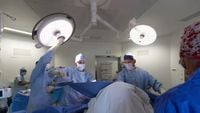In a striking juxtaposition of public sentiment and legislative reality, the issue of abortion rights in Germany continues to evoke strong reactions and complex discussions. Since 1973, voluntary termination of pregnancy (IVG) has been illegal in the Federal Republic of Germany, despite the fact that women in East Germany enjoyed the right to abortion. According to Article 218 of the German Penal Code, "Anyone who terminates a pregnancy is liable to imprisonment for up to three years or a fine." However, in practice, prosecutions are rare if the procedure occurs within the first twelve weeks of pregnancy, provided it follows a mandatory counseling session.
In a recent visit to Cologne, North Rhine-Westphalia, journalist Eloïse Gosselin met with gynecologist Gabriella Stöcker, who has been working at Pro Familia since 2006. Pro Familia is a counseling center dedicated to supporting women throughout their pregnancies, regardless of whether they choose to continue or terminate their pregnancies. Stöcker emphasized the importance of these counseling sessions, stating that they provide essential information and support to women navigating their options.
Access to reproductive health services, however, has been increasingly complicated, especially for women in rural areas. The challenges are particularly acute for women and queer individuals who rely on family planning and sexual health centers that are facing budget cuts. As such, many women are left without adequate access to gynecological follow-ups and screenings. In response, Le Monde has issued a call for testimonies from women in rural areas who have struggled to obtain IVG services or gynecological care.
These testimonies are crucial as they highlight the systemic barriers faced by marginalized groups, including lesbians, bisexuals, and transgender individuals, who often find themselves without essential healthcare services. Le Monde assures that anonymity will be preserved for those who share their stories, emphasizing the importance of personal narratives in shedding light on this pressing issue.
Meanwhile, the cultural landscape surrounding reproductive rights has also been influenced by events such as the Coachella music festival. Over its 26-year history, Coachella has become a cultural phenomenon, showcasing an impressive array of artists and performances. The 2025 edition, running from April 12 to April 20, has seen its fair share of controversy, particularly regarding its owner Philip Anschutz's past donations to anti-LGBTQ+ and anti-abortion organizations.
In 2017, The Fader revealed that Anschutz had funded several organizations hostile to LGBTQ+ rights, sparking the #Nochella movement, which called for a boycott of the festival. Following public outcry, Anschutz's lawyer stated in 2018 that his foundation ceased funding certain organizations after learning their activities were incompatible with their values. However, the controversy resurfaced in 2022 when the U.S. Supreme Court overturned Roe v. Wade, and shortly thereafter, the Anschutz Corporation donated $75,000 to the Republican Attorneys General Association (RAGA), which aimed to combat pro-abortion initiatives.
In an attempt to mitigate backlash, Anschutz's company AEG announced that it would cover travel and accommodation costs for women needing to leave their states for reproductive health services, including abortion. This declaration stands in stark contrast to the donations made, leaving many to question the sincerity of the company's commitment to women's rights.
As the festival continues, it showcases a diverse lineup of artists, many of whom advocate for LGBTQ+ rights and reproductive freedom. Notably, on April 12, 2025, Senator Bernie Sanders delivered a passionate speech at Coachella, urging attendees to fight for their rights and resist the current administration's policies. His message resonated with the festival-goers, highlighting the power of cultural events to amplify progressive voices.
In another dimension of the abortion debate, the case of Priscilla Dray has drawn significant attention. After undergoing an IVG at the CHU of Bordeaux, Dray suffered severe medical complications that resulted in the amputation of all four of her limbs. On April 17, 2025, two doctors involved in her care were convicted of involuntary bodily harm, receiving suspended sentences and fines. Dray's case underscores the critical need for accountability in medical care, particularly in reproductive health.
Dray, who was 36 and a mother of three at the time of her procedure in July 2011, experienced a rapid decline in her health following the operation. After developing a high fever, she sought emergency care but was not treated adequately. The doctors involved were found guilty of serious medical errors, one of whom failed to ensure proper oversight and care for Dray during her recovery.
Reflecting on her ordeal, Dray stated, "They massacred a life," highlighting the devastating impact of medical negligence. Since her infection with a type A streptococcus pyogenes, she has undergone 92 operations and rehabilitation in the United States. Despite the convictions, she expressed concern that the penalties were insufficient to prevent future incidents, stating, "They can continue to practice and do it again."
These intertwined narratives illustrate the complexities surrounding reproductive rights in Germany and beyond. As discussions continue, both the legal landscape and cultural attitudes toward abortion and women's rights remain at a critical juncture. The voices of women like Priscilla Dray, alongside the cultural commentary from events like Coachella, serve to illuminate the ongoing struggles and the urgent need for reform in reproductive healthcare.







